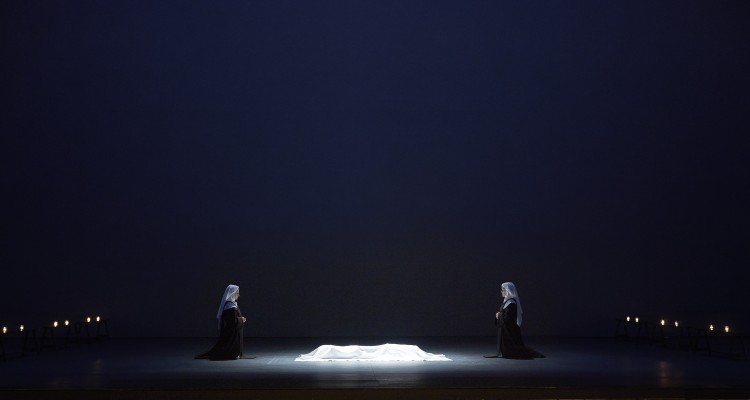
(l – r) Irina Mishura (back to camera) as Mother Marie and Judith Forst as Madame de Croissy in the Canadian Opera Company’s production of Dialogues des Carmélites, 2013.
The last opening night of the season brings a particular mixture of happiness and sadness. One is excited to see the final production of the Spring 2013 season, but to know one has to wait until the Fall to experience it again feels a little wrong. The Canadian Opera Company caps off its 2012/2013 season with Dialogues des Carmelites.
A relative newcomer, (I consider it young if it’s younger than my mother) Poulenc’s Carmelites was first staged in Milan in 1957. The story is set during the French Revolution; Blanche, a young woman afraid of the uncertainty of the times, joins the Carmelite order to find solace and peace. Unfortunately peace is not what she finds amidst the cloistered walls, as Blanche witnesses the unsettling death of the old Prioress who foreshadows further turmoil.
Certainly, as the revolutionists disband the convent and the nuns are tested, it is easy to predict that there is no upturn for these women. The dark and heavy undertone of the entire production is underscored by the three best elements: the orchestra, the lighting and the use of the chorus.
Poulenc’s score is haunting and has all the right nuances for anyone who might be sitting in Ring 5 and not quite able to differentiate the faces on stage, but experience that emotion through the sound in the air. As I’ve mentioned before, any production with Johannes Debus with his back to me is one I enjoy all the more. Somehow I don’t even need to read that he is conducting; I feel like I just know.
Adding to this darkness was the actual darkness. Cor van den Brink re-creates the original lighting design by Jean Kalman, which most effectively uses shadows cast from a white light from stage right. The generous use of candles also provides a gothic coldness that is a perfect fit.
Finally, the use of the revolutionaries or rioters with pitch forks is highly effective. The large group is used to set scale and context to the stage, where a character can be lost in, or completely stand out from the crowd. I’m a sucker for using the movement of a crowd to dress a set – it’s artistic and efficient. Two of my favourite things.
This production did have its drawbacks, to be certain. For one, the ending certainly did drag. Costuming wasn’t overly on-the-nose, which I generally dislike, however, it didn’t move me as being particularly innovative. Knowing that nuns do dress identically, it was hard to follow which sister was which. That may be due to what I found to be voices that didn’t quite differentiate themselves well. Perhaps you could sum that up to my less than perfect ear; however, vocally I wasn’t overly blown away. Judith Forst was impressive as Madame de Croissy (First Prioress), but, she also has the meatiest vocal role.
Join the nuns for five additional shows until May 25. And return for a new season in the fall. For more, please visit coc.ca
The close of this season marks a particular sadness for me, as I move away from the scene that is TO, my home for the last few years. I thank the Canadian Opera Company and TheSceneinTO for providing me the opportunity to expand my knowledge of opera and to share it with an audience who I hope can find opera accessible–the same way I love to enjoy it–through an entirely sensory experience, where I taste with my ears, feel with my eyes and listen with my heart.


I’m glad to see that you are on your way to greater and better things. Hopefully your English skills will advance in the same direction. Your last paragraph was particularly, excruciatingly (note the unnecessary use of adverbs) painful. Nevertheless, in the words of the timeless Tupac Shakur, “You either evolve or you disappear.”
Wishing you the best. I will miss the schadenfreude that your reviews bring. You have truly brought opera to the people.